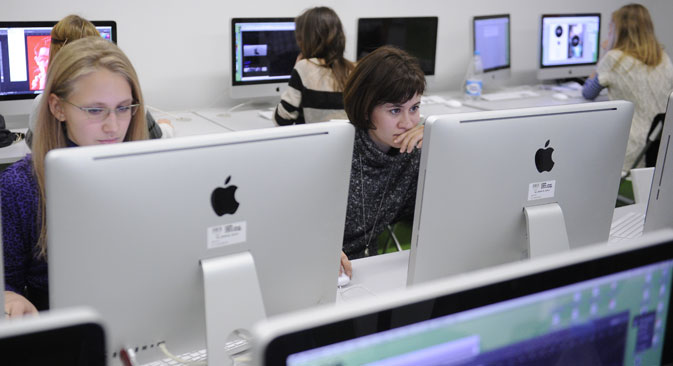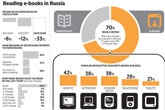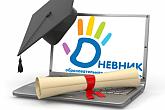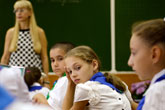The online revolution is a class act

Net gain: young Russians are benefiting from a big programme of investment by information technology companies in schools. Source: ITAR-TASS
In Russian schools, paper is slowly giving way to e-books, tablets and laptops as more and more information technology companies emerge to provide new services for education. If 15 years ago computers were used in schools mostly to teach children basic programming and common office applications, as well as to print endless documents, many of today’s pupils now use all sorts of gadgets for their studies on a daily basis.
E-learning has taken its place among the most popular segments of the Russian IT business market in the past few years. Start-ups and established companies see huge potential for innovation, supported by government and private venture capital. In 2012-13 alone, more than $10m (£6.3m) was invested in education technology companies in Russia, according to data from trade publications.
New technologies have found their way into all parts of the education market, including schools, private tutoring and distance learning. While it lags behind some western countries in terms of development, the market has many very promising players.
Learning in the cloud
About half of the past year’s investment in education technologies went into Dnevnik.ru, a start-up launched in 2009 that provides an all-round e-document management system for nearly 29,000 Russian schools, more than half the national total. The system is hosted by the company, and all users need to do is log into their account at the website.
Gavriil Levi, who started the project after witnessing the lack of communication between his parents and his younger brother’s school, says that Dnevnik.ru has grown from a self-financed start-up to the biggest education initiative in the country.
“We connected several schools ‘manually’ at first. We went to meet principals, parents and teachers, presented the product and explained why it’s useful,” Mr Levi recalls.
Growth has been boosted by a Russian government decree that all schools must introduce e-document flow systems by 2014. Mr Levi recently told Vedomosti newspaper that he expects Dnevnik.ru to be in up to 35,000 schools by 2014, while the other 20,000 will use rivals such as NetSchool and Paragraph.
Dnevnik.ru expects to become profitable early next year. Mr Levi says: “Basic functions are and will always be free, while paid features such as text messaging, the access control system, or electronic vouchers for school canteens, can make the system even more useful.”
Lightening the load
Several other companies aim to help schoolchildren with their everyday tasks. The most obvious problem to solve is the one involving the heavy and bulky textbooks that children have to bring to the school every day.
Since December last year, the Federal Institute of Education Development has been running a nationwide e-textbook distribution system in partnership with Azbuka. The latter has developed the system and converted current textbooks for digital use; it argues that books accessible on a tablet or laptop are cheaper than conventional paper ones, allowing schools to cut costs.
It was not long before the market for electronic courseware in schools attracted other players. In August, Russia’s IT behemoth Lanit said it would start offering a solution, and it is a safe guess that schools will soon be able to choose from a variety of providers.
Yet even when large, state-supported companies enter the market, there’s still space for start-ups to make an impact. YaKlass, valued in a recent investment round at $2m (£1.26m), claims to have found a solution to a problem that has challenged teachers ever since internet access became widely available.
“[Today’s] children are used to copying homework from the internet and teachers have no means to prevent it,” said Valery Nikitin, YaKlass’s founder and chief executive.
The solution Nikitin’s company offers lies in procedurally generated
homework tasks that are unique for every schoolchild: there is no chance of the
pupil finding ready-made
answers online. The idea first came to a mathematics professor who gave
procedurally generated tasks to his students. YaKlass bought the idea and
adjusted it to suit the needs of Russian schools.
Changing our lives
New technologies have undoubtedly changed our lives: the way we communicate with each other, the way we learn and teach, the way we travel and the way we spend time at home – everything was different before internet-enabled computers, mobile phones and other undoubtedly useful gadgets were introduced. The question remains, however, whether the effect of this is always positive.
It’s certainly true that, thanks to the internet, education has become more accessible and convenient for those who want to learn, while new services bring a variety of subjects and sources that it would simply have been impossible to access 20 years ago.
According to Mr Levi, there have even been experiments conducted that prove a correlation between the level of information technology development, academic progress and attendance in school.
On the other hand, plagiarism and general sloppiness are widely believed to be a result of children’s use of the internet. Some critics even claim that soon many children will not be able to write with a pen or pencil, but only type on a keyboard or touch screen.
While only time can judge the merits of this debate, it can already be seen that many problems produced by new technologies can also be solved using the same technologies. In the long run, that may leave society with just the positive effects. What’s needed most is passionate people willing to work in this field and innovate — and this is something today’s Russia does not seem to lack.
E-learning goes the distance to deliver on demand
Away from schools, distance learning is an emerging trend. While many Russian students enrol for courses with popular international services, such as Coursera, Udacity and Khan Academy, there are domestic alternatives that can compete with their western counterparts.
One of the best-known examples is LinguaLeo, a web service that uses popular books and television series to teach English to its users. The company is seen as one of the most successful Russian start-ups in the field of e-learning, especially after securing a $3m (£1.9m) investment round from Runa Capital last year.
Private tuition has also become very popular in the past 20 years. One of the biggest players in this field is Eruditor Group, a network of online marketplaces for finding and booking teachers, which was launched in 2006 with a project called Vash Repetitor, which is Russian for ‘Your private tutor’.
The company has received more than $17m in funding since then, including $12m this year, to develop its services.
In summer 2012 a team of specialists launched Rosalind, an educational project named after the mid-20th century British biophysicist Rosalind Franklin. The project is an English-language web portal where users study bioinformatics, solving biological problems through computer programming. A team of Russian and American scientists are offering everyone an opportunity to explore a cutting-edge branch of modern science. Users around the world are giving the team’s unique project due credit.
All rights reserved by Rossiyskaya Gazeta.
Subscribe
to our newsletter!
Get the week's best stories straight to your inbox



